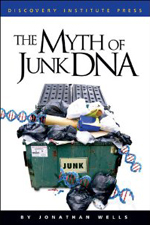 Jonathan Wells’ The Myth of Junk DNA, is a well-written book that manages to accomplish two separate tasks: to silence the Darwinists who had claimed that recent genomic discoveries supported their dystopic version of The Signature in the Cell; and to bring all of us up-to-date on the breath-taking mysteries being decoded from this most ancient script.
Jonathan Wells’ The Myth of Junk DNA, is a well-written book that manages to accomplish two separate tasks: to silence the Darwinists who had claimed that recent genomic discoveries supported their dystopic version of The Signature in the Cell; and to bring all of us up-to-date on the breath-taking mysteries being decoded from this most ancient script.
He begins by picking up where Stephen Meyer left off, telling us that within each cell is this memory chip, this software program that directs everything we are and ever meant to be. When Watson and Crick decoded the DNA, there was great expectation that soon we would find the gene to every talent and attribute we had ever wished we had been born with. Sci-fi was filled with stories about a DNA pill that would turn you into a concert pianist, a ballerina, or a nuclear physicist, because the genes for all these talents could manually remedy what evolution had denied you. Soon a billion-dollar government program was begun to decode the human genome, after which, it was widely touted, we would find the cure to cancer and the common cold. The three billion base pairs of the human genome, it was thought, would hold genes stacked up cheek-to-jowl, together encoding some 100,000 different proteins. We knew how to count genes because we had already decoded the way the cell made protein, first by making RNA copies of the DNA, and then sending the RNA to the ribosome factory, which could identify the unique “start” and “stop” codes among the 64 different 3-letter “words” of the RNA software that marked the beginning and end of each gene.
After a decade of work and to everyone’s great surprise, the human genome project found only 10,000 such start-stop pairs, suggesting that you and I are made out of fewer proteins than an amoeba! Furthermore, over 90% of the missing genes were DNA that apparently did nothing. Much of this “dark matter” was in long “stutter repeats” that couldn’t even make a useful protein if you inserted the start and stop codons yourself. All that work, and nothing to show for it! Neither cancer nor the common cold was cured, and instead an even greater mystery was uncovered.